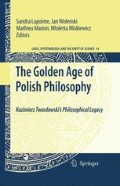There are at least two kinds of phenomenology: hermeneutic and descriptive. The latter rests on the idea that what is given in conscious experience is direct, akin to perception – what most phenomenologist would have called “intuition” – and is therefore a genuine source of knowledge. The theories of early analytical phenomenologists were aimed at providing an understanding of the latter. For instance, the well known distinction between the quality, the content, and the object of mental acts elaborated by Twardowski, Husserl and Meinong in the wake of Brentano was meant as a conceptual tool for the purpose of analyzing and describing cognitive processes such as “representation” and “judgment”. Leopold Blaustein, a Lvovian philosopher who belongs to Twardowski’s School, sought to develop the full heuristic value of this theory of intentionality and, for one thing, his results can be seen to have anticipated some of the most significant aspects of contemporary theories of cognition, and of perception in particular.
Access this chapter
Tax calculation will be finalised at checkout
Purchases are for personal use only
Preview
Unable to display preview. Download preview PDF.
Bibliography
Auerbach, W. (1931) O wątpieniu (On Doubt), Lvov, Księga Pamiątkowa PTF.
Auerbach, W. (1930), ‘Review of Husserlowska nauka o akcie, treści i przedmiocie przedstawienia’ (Husserl’s theory on act, content and object of representations), Przegląd Humanistyczny 5/2, 210–211.
Auerbach, W. (1931), ‘Review of Przedstawienia imaginatywne’ (Imaginative Presentations), Przegląd Humanistyczny, 6/1–2, 214–216.
Auerbach, W. (1935) ‘Zagadnienie wartości poznawczej sądów przypomnieniowych’ (The Question of the Heuristic Value of Memory Judgments), Kwartalnik Psychologiczny 7, 25–60.
Blaustein, L. (1928), Husserlowska nauka o akcie, treści i przedmiocie przedstawień (Husserl’s theory on act, content and object of representations), Lvov, Archiwum Towarzystwa Naukowego we Lwowie.
Blaustein, L. (1930a), ‘Edmund Husserl i jego fenomenologia’ (Edmund Husserl and his Phenomenology), Przegląd Humanistyczny 2. See also ‘Próba krytycznej oceny fenomenologii’ (Essay of a Critic of Phenomenology), Ruch Filozoficzny 11, 1928/9, 164–166.
Blaustein, L. (1930b), Przedstawienia imaginatywne. Studyum z pogranicza psychologii i estetyki (Imaginative Presentations), Lvov, nakładem Polskiego Towarzystwa Filozoficznego.
Blaustein, L. (1931a), Przedstawienia schematyczne i symboliczne. Badania z pogranicza psychologji i estetyki (Schematic and symbolic representations. Studies on the border of psychology and aesthetics), Lvov, nakładem Przeglądu Humanistycznego.
Blaustein, L. (1931b), ‘O naoczności jako właściwości niektórych przedstawień’ (On intuition as a property of some representations), Lvov, Księga Pamiątkowa Polskiego Towarzystwa Filozoficznego we Lwowie.
Blaustein, L. (1933), ‘Przyczynki do psychologii widza kinowego’ (On the psychology of a moviegoer), Kwartalnik Psychologiczny 4, 192–236
Blaustein, L. (1934), ‘O lekturze filozoficznej w szkole średniej’ (On Reading Philosophy in Colleges), Lvov, Gimnazjum 2.
Blaustein, L. (1937), ‘Der imaginative Kunstgegenstand und seine Gegebenheitsweise’ (The Imaginary Work of Art and Its Mode of Givenness), Deuxième Congrès International d’Esthétique et de Science de l’Art, Paris, Alcan, 245–249.
Blaustein, L. (1939), ‘Studies on the perception of radiophonic pieces’, Kwartalnik Psychologiczny 11, 106–161
Chudy, W. (1981), ‘Zagadnienie naoczności aktów poznawczych’ (The Problem of the Evidence of Cognitive Acts), Roczniki Filozoficzne 1, 185–194.
Dębowski, J. (1996), ‘Naoczność i jej rodzaje w ujęciu K. Twardowskiego i L. Blausteina’ (Evidence and Its Kinds in the Conceptions of Kazimierz Twardowski and Leopold Blaustein), Annales Universitis Mariae Curie-Sklodowska 21–22, 75–96.
Domagała, T. (1990), ‘Leopold Blaustein – nauczyciel folozofii’, Edukacja Folozoficzna 10, 125–128.
Ginsberg, E. (1929), ‘Zur Husserlschen Lehre von Ganzen und Teilen’, Archiv für systematische Philosophie 32, 109–120.
Ginsberg, E. (1938), ‘W sprawie pojęć samodzielności i niesamodzielności’, Księga pamiątkowa PTF we Lwowie, Lwów, Książnica Atlas, 143-168; Engl. Trans. ‘On the concept of existential dependence and independence’ in Smith, B. (ed.) Parts and Moments. Studies in Logic and formal Ontology, Munich, Philosophia, 1982, 266–288.
Gromska, D. (1948), ‘Philosophes polonais morts entre 1939 et 1945. Leopold Blaustein’, Studia Philosophica 3, 63–67.
Ingarden, R. (1946), ‘Leopold Blaustein’, Przegląd Filozoficzny 42, 335–336.
Jadacki, J. and Markiewicz, M. (eds.) (1993), …A mądrości nic nie przemoże, (Wisdom Will Never Be Defeated), Warsaw, Polskie Towarzystwo Filozoficzne.
Jadczak, R. (1993), ‘Uczeń i nauczyciel. Z listów Leopolda Blausteina do Kazimierza Twardowskiego z lat 1927–1930’ (Disciple and Master. The Correspondence Between Leopold Blaustein and Kazimierz Twardowski (1927–1930)), in Jadacki and Markiewicz 1993.
Lopes, D. (1999) Understanding Pictures, Oxford, OUP.
McLuhan, M. (1964) Understanding Media: The Extensions of Man, New York McGraw Hill.
Miskiewicz, W. (2003a), ‘Ingarden et la réception de Brentano en Pologne’, Les Etudes Philosophiques, 2003/1, 83–97.
Miskiewicz, W. (2003b), ‘Husserl contre psychologisme et cognitivisme: la naturalisation superficielle et la psychologie d’un style nouveau dans les Recherches Logiques’, Aux origines de la phénoménologie, D. Fisette and S. Lapointe (eds.), Paris/Quebec, Vrin/PUL, 221–240.
Rosińska, Z. (2001), Blaustein. Koncepcja odbioru mediów. (Blaustein. A Conception of Media), Warsaw, Prószyński i S-ka.
Rosińska, Z. (2005), Leopold Blaustein. Wybór Pism Estetycznych (Leopold Blaustein. Selected Papers in Aesthetics), Cracow, Universitas.
Scruton, R. (1982), Art and Imagination, London, Routledge and Kegan Paul.
Twardowski, K. (1894), Zur Lehre vom Inhalt und Gegenstand der Vorstellungen: Eine psychologische Untersuchung, Vienna, Alfred Hölder. Eng. Trans. On the Content and Object of Presentations, The Hague, Martinus Nijhoff, 1977.
Woleński, J. (1999), ‘Twardowski and the Distinction between Content and Object’, Brentano Studien 8 (1998/99), 15–35; reprinted in J. Woleński, Essays in the History of Logic and Logical Philosophy, Cracow, Jagiellonian University Press, 22–35.
Wollheim, R. (1980), Art and Objects, Cambridge, CUP.
Wollheim, R. (1988) Painting as an Art, London, Thames and Hudson.
Author information
Authors and Affiliations
Editor information
Editors and Affiliations
Rights and permissions
Copyright information
© 2009 Springer Science+Business Media B.V.
About this chapter
Cite this chapter
Miskiewicz, W. (2009). Leopold Blaustein’s Analytical Phenomenology. In: Lapointe, S., Wolénski, J., Marion, M., Miskiewicz, W. (eds) The Golden Age of Polish Philosophy. Logic, Epistemology, and the Unity of Science, vol 16. Springer, Dordrecht. https://doi.org/10.1007/978-90-481-2401-5_13
Download citation
DOI: https://doi.org/10.1007/978-90-481-2401-5_13
Publisher Name: Springer, Dordrecht
Print ISBN: 978-90-481-2400-8
Online ISBN: 978-90-481-2401-5
eBook Packages: Humanities, Social Sciences and LawPhilosophy and Religion (R0)

